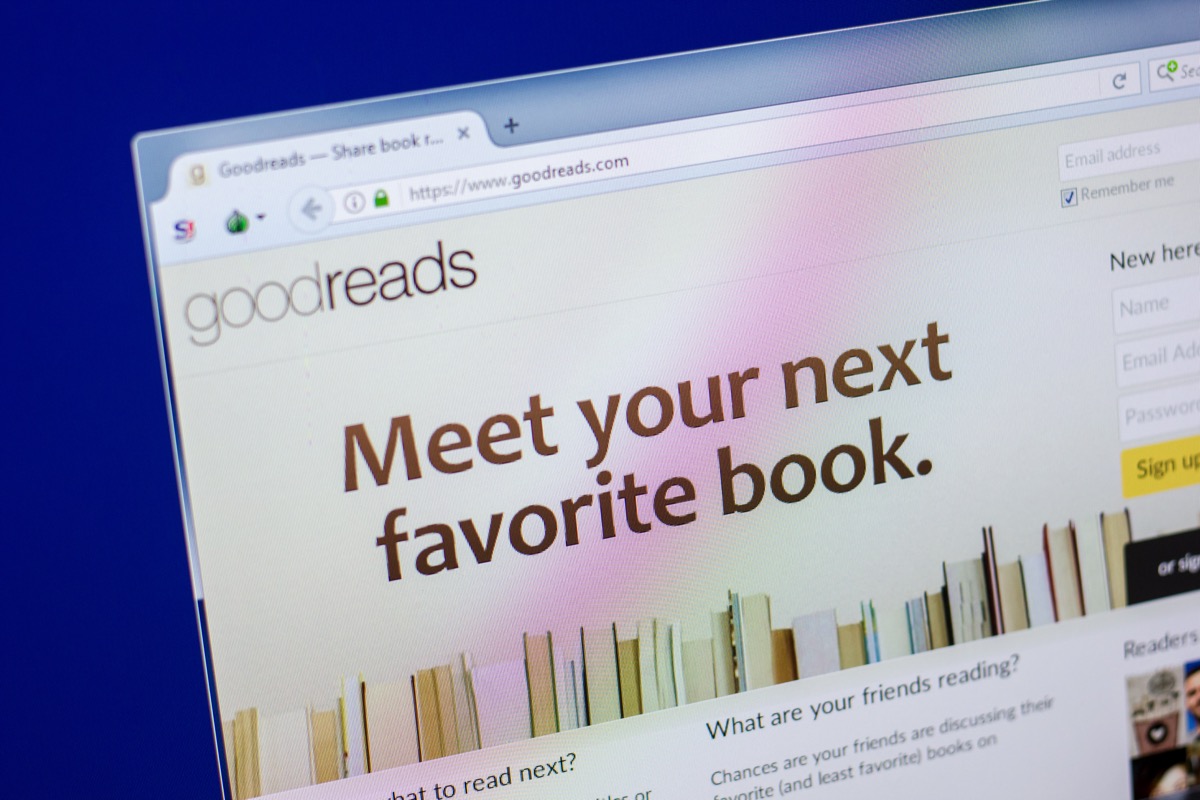What Is Review-Bombing? The Goodreads Controversy Explained

You’d expect there to be dramatic stories of intrigue and deception on Goodreads, a social media site that allows users to log the books they’ve read and leave reviews. However, the biggest drama related to the site can’t be found in the pages of any of the countless books discussed there. Instead, the controversy comes from how people are using the site—especially in the case of so-called “review-bombing.”
Recently, a scandal has emerged that has revealed the darker side of Goodreads and has many people—readers and authors alike—wondering if the once-popular platform has ultimately had a negative impact on the book community. Read on to learn how Goodreads works, what review-bombing is and how it impacts authors, and what the site is doing to discourage trolls.
RELATED: I Read 365 Books This Year and These Were My 10 Favorites.
What Is Goodreads?

Goodreads was founded in January 2007 by Otis Chandler and Elizabeth Khuri Chandler, a programmer and journalist, respectively. They met at Stanford University and created the social cataloging site as a means to help people discover new books.
Though it started small, Goodreads soon took off, and by 2012, it had 11 million members who had logged a collective 395 million books. In addition to the initial ability to log books and leave reviews, Goodreads added recommendation engines that help direct users to similar books they might enjoy based on their tastes.
In 2013, Amazon—already a major, near-monopolistic giant in the book space—bought Goodreads. The site had 16 million members at the time.
Now, Goodreads has more than 150 million members, and it’s the dominant source for book reviews and recommendations on the internet. It’s because the site is so influential that the way some misuse it has become a significant issue in the publishing world.
RELATED: 16 Ways to Create a Cozy Reading Nook.
How Does Goodreads Work?

Goodreads is free to use, though you need to make an account to get the most out of it. Once logged in, users can log books by creating “bookshelves.” You can create lists of books you’ve read, books you’re currently reading, and books you want to read. (You can still browse Goodreads without an account.)
When you log a book that you’ve read, you can leave a review on a scale of one to five stars, and you can write a written review to accompany it. Leaving starred or written reviews is optional, as it’s possible to simply mark that you’ve read a book without adding any additional commentary.
There are other features, too. Goodreads will recommend books similar to the ones you’ve logged and liked, and you can expand your network by following authors, connecting with other users, and joining groups that will further expose you to new books you might enjoy. Users can also browse excerpts and quotes from books, read exclusive author interviews, and participate in reading challenges and contests.
You can’t really read books “on” Goodreads, though thanks in part to the Amazon acquisition, the site tends to make it pretty easy to buy them. For many books, you can read a preview, then click a link that will take you to Amazon, where you can easily purchase a Kindle (or physical) version of the book.
A volunteer group called the Goodreads Librarians is responsible for adding books to the database. They’re also responsible for making sure books have the correct page count, cover art, and various editions all represented.
Goodreads can be used in a browser, though there are mobile app versions available as well.
What Is Review-Bombing?

Review-bombing isn’t exclusive to Goodreads, but it has been an issue on the site for sometime. It’s the practice of leaving very negative reviews—typically one star, in Goodreads’ case—in an attempt to drag down a book’s average rating. The reasons why people do this varies. Sometimes it’s because they don’t like the politics of a book; other times it’s retaliation against an author. Books by non-white authors and/or those that deal with LGBTQ+ themes are frequent targets of review-bombers.
Whatever the reason, review-bombing can have real, tangible consequences. Because Goodreads is so widely used and so influential, it can ruin a book’s chances at success if would-be readers look it up on the site to find it has a horrible average rating. This can be devastating to authors, especially because review-bombers often slam books that they have not read and perhaps have not even come out yet, which can make a book sell poorly. In short, review-bombing weaponizes Goodreads.
“It can be incredibly hurtful, and it’s frustrating that people are allowed to review books this way if they haven’t read them,” author Roxane Gay told The New York Times last year. “Worse, they’re allowed to review books that haven’t even been written. I have books on there being reviewed that I’m not finished with yet.”
Frequently, review-bombers have multiple accounts so they can leave several negative reviews to drag down the average. Sometimes review-bombings will be coordinated, so many people with the same ugly goal can leave negative reviews en masse. At no point in leaving a review do Goodreads users need to prove that they have actually read the book in question.
In a statement, Goodreads told The New York Times that it “takes the responsibility of maintaining the authenticity and integrity of ratings and protecting our community of readers and authors very seriously.” The site also claimed that they’re working to improve ways for users to flag fraudulent reviews. However, review-bombing is still widespread.
The Goodreads Controversy: Explained
Despite its seemingly simple and innocuous purpose, Goodreads has become controversial for a number of reasons (its role in contributing to Amazon’s domination of book sales being one), but the latest, possibly dam-breaking controversy came late last year.
In late 2023, several sci-fi and fantasy books (most written by non-white authors) got flooded with one-star reviews on Goodreads. The review-bombing plot thickened because almost all of the accounts that had left one-star reviews on these books had also left five-star reviews on Crown of Starlight, author Cait Corrain’s debut fantasy novel that was set for an early 2024 release.
Sci-fi author Xiran Jay Zhao was perhaps the first to spot the connection, and she subtweeted Corrain, writing, “If you as a debut author are going to make a bunch of fake Goodreads accounts one-star-bombing fellow debuts you’re threatened by can you at least not make it so obvious by upvoting your own book on a bajillion different lists with those same accounts.” A few days later, Zhao explained the situation more explicitly in a TikTok, and the scandal worked Book Twitter and BookTok into a furry.
Corrain initially tried to claim that a friend of hers was responsible for the review-bombing, but that friend did not exist. Eventually, she admitted that she had left the negative reviews to hurt books that she perceived as “competition” for her debut novel.
Corrain posted an apology, writing that she was “fighting a losing battle against depression, alcoholism, and substance abuse” and was having a “psychological breakdown.” She admitted that she had made six fake accounts that left reviews boosting her as-yet-unreleased book and bad-mouthing others.
“I felt no ill will towards any of them,” the apology reads. “It was just my fear about how my book would be received running out of control.”
In the wake of the scandal, Corrain’s publisher and agent dropped her, and Crown of Starlight was not released.
RELATED: How Your Eye Color Affects Your Reading Ability, New Study Finds.
How You Can Use Goodreads Productively

This controversy, while full of twists and turns and scandalous details, is just one high-profile instance of some of the problems that are plaguing Goodreads. There have been other scandals, including an author who tracked down and harassed users who were giving her books negative reviews.
CNN, The New Statesman, The Guardian, and The New York Times are just a few of the outlets that have published articles about the site’s myriad issues, all concluding that this once-beloved resource for book lovers has evolved into something that’s potentially bad for books, the people who read them, and the people who write them.
So, what can you do to use Goodreads productively? It’s simple, actually: Just use the service as it was originally intended to be used. If everybody used Goodreads to log the books they’ve read, add upcoming releases they’re excited about to their “To Read” bookshelf, and leave honest (but constructive!) reviews for books they’ve read (and only books they’ve read), it would solve a lot of the problems. Goodreads would still hold an oversized place of importance and influence in the publishing world, but at least it would be an honest one.
Unfortunately, the problems are systemic at this point. Most individuals are using the service with good intentions, but as long as there are bad actors using Goodreads to further their agendas and review-bomb books that might not have even come out yet, there will be negative outcomes.
In an opinion piece for The New York Times, book critic Maris Kreizman offered some suggestions for how to “rescue book lovers from this online hellscape.”
“Goodreads desperately needs more human moderation to monitor the goings-on,” Kreizman wrote. She suggested that the company hire some of the volunteer Goodreads Librarians to act as official, paid employees who could prevent books that haven’t been released yet from being put on the site, thereby making them vulnerable to pre-release review-bombing.
In short, it’s on Goodreads (and Amazon) to make Goodreads better. Gretchen Felker-Martin, a trans horror author whose books have been review-bombed, told The New York Times that she was doubtful the company would take action, having not gotten a response when she reached out to Goodreads about the reviews.
“I don’t think Goodreads has an economic incentive to be any better,” Felker-Martin told the paper. “It would be just a gargantuan job to significantly monitor the kinds of abuse that’s being heaped onto people every single day, but there’s certainly some middle ground between breaking your back trying to deal with all of it, and dealing with none of it.”
It should be noted that there are some alternatives to Goodreads, including The Storygraph and Italic Type, though neither is even a fraction as widely used. The size of Goodreads—and the number of people who use it—is still the service’s greatest strength, even as that scale is responsible for some of the problems that plague it. If you are going to use Goodreads, the best you as an individual can do is not make it worse by reviewing in bad faith.